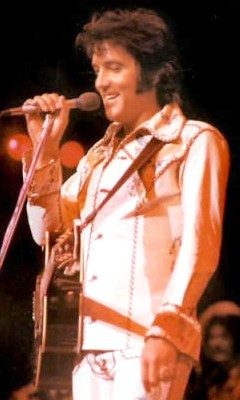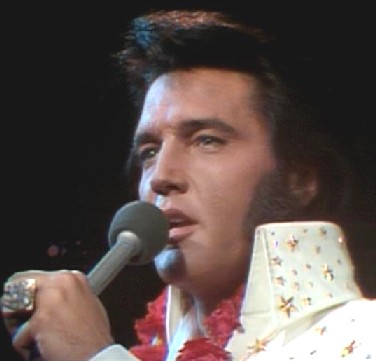
Quote:
"Elvis Presley is the greatest cultural force in the 20th century."
(Leonard Bernstein)
Quote:
"If you're an Elvis fan, no explanation is necessary; If you're not an Elvis fan, no explanation is possible."
(George Klein)
Quote:
"For a dead man, Elvis Presley is awfully noisy."
(Professor Gilbert B. Rodman)
Quote:
"History has him as this good old country boy, Elvis is about as country as Bono!"
(Jerry Schilling)
Quote:
"Absolute id crashed into absolute superego...as the uptightset man in America shook hands with just about the loosest."
(Mark Feeney on the 'Elvis meets Nixon' meeting)
Quote:
"Elvis is everywhere"
(Mojo Nixon & Skid Roper)
Quote:
"...especially in the South, they talk about Elvis and Jesus in the same breath"
(Michael Ventura, LA Weekly)
|
|
The schism between Elvis' stage and studio work
- Spotlight by Harley Payette
|
By EIN contributor Harley Payette
Before he became Bruce Springsteen's manager, Jon Landau wrote an excellent review of Elvis' stage show, he titled "In Praise of Elvis Presley". In the piece, Landau made an interesting observation about Elvis' stage show. Unlike an artist like Dylan who pleased the audience by pleasing himself, Elvis pleased himself by pleasing the audience. It was just an observation not a value judgement and I think both approaches work.
I do think it was a true statement. As much as Elvis exercised some demons on stage with songs like "You Gave Me a Mountain" and indulged some personal passions with "How Great Thou Art", the stage show was for the crowd from the 2001 opening, to the majority of tried and true material, to the elaborate costumes to the scarves and the kisses. You could see back as far as 1956 the way that "Hound Dog" belongs to the crowd. |
 |
When Elvis gives the songs cryptic introductions like as "a great philosopher once said" or goes into a false start, you can sense his pleasure in playing with the crowd's anticipation of his most popular song. Later on when Elvis walking through his '50s classics, the only reasons they remained in the show was because- walk through or not- they were what the audience wanted to hear.
A prominent example of the impact an audience could have on Elvis' stage work was the August 1974 revamp that lasted only a few shows because of audience indifference. Perhaps an even more telling story is of the night Elvis gave away jewelry to the first few rows in the audience to turn the crowd into a frenzy.
What makes this approach to stage performance so fascinating to me is that Elvis had almost the exact opposite approach in the recording studio. From Sun records on, he beat walked to his own drum putting a record out there and letting the chips fall where they may. Think of that first single. "They'll run us out of town," said Bill Black listening to a playback. There really wasn't a lot to lose there but you see the point.
Move ahead to "Heartbreak Hotel" one of the weirdest most intense songs to ever make the Top 40. More importantly it sounded like nothing he had done to that time therefore risking the alienation of his audience. Later that year he did record the by popular demand "Hound Dog" but in a radically different rendition than he did on TV. Months later, the king of the beat put out a single with no beat at all in "Love Me Tender".
When he returned from the army, instead of following the teen idolish "Stuck on You" with another soft rocker (very popular in that day) or rocking out like the old days, he does a slice of Neapolitan cha-cha-cha with operatic overtones. Then he comes through with a slice of parlor balladry in "Are You Lonesome To-Night?" Some fans must have seen it as grandpa music. This was such a radical left-turn against audience expectations that fans are still debating it 40 years later.
In '63, it would have been easy to just dump a vocal rendition of "Memphis" on the market in the wake of Lonnie Mack's massively popular instrumental. Yet Elvis insisted on tinkering until he found the sound in his head. He wound up losing the hit to Johnny Rivers' much more pedestrian version.
Later in the decade, Elvis dumps "You'll Never Walk Alone" on the market as his latest single despite the fact that the song was only recently a Top 40 single for Gerry and the Pacemakers.
Why?
Because he liked it. |
 |
"American Trilogy" was even more extreme. The Mickey Newbury version hadn't been out of the Top 40 six months when Elvis put his record out. Not only that, it was extremely long (for the time) and had no real pop hook. Yet, he believed this was his best shot and that's that.
Another rocker would have been a natural follow-up to "Burning Love" but Elvis put out the divorce record because that's what he was into and he kept putting them out for the same reason. Further many of his greatest performances of the 1970s like "Promised Land" came out of Elvis simply singing for his own entertainment. In all of these cases, Elvis is asking his audience to come to him. This is something he never really did on stage.
Again I'm not judging, as the please the audience approach made Elvis' show in many ways an unforgettable spectacle. It's just an interesting dichotomy and makes Elvis' work all the more interesting. I think there are logical reasons to explain the difference in approach. One, of course, is the direct impact of the audience. That applause can be addicting. Another is the unpredictable nature of the record industry. While formulas work on stage, they often wear thin on record buyers. Plus, without the direct contact with audiences it is hard to know what they want. You only find out if something works after it is done.
Still though other artists have faced some of the same challenges and approached it differently or in a more consistent manner. It goes to show that Nick Tosches got something right when he said: "I don't think Elvis Presley will ever be solved."
This Spotlight written by EIN contributor Harley Payette.
-Copyright, July 2005-
Click here to comment on this article
|
Quote:
"Elvis Presley is the supreme socio-cultural icon in the history of pop culture"
(Dr. Garry Enders)
Quote:
" Elvis is the 'glue' which holds our society together....which subconciously gives our world meaning"
(Anonymous)
Quote:
"Eventually everybody has to die, except Elvis"
(humorist Dave Barry)
Quote:
"He is the "Big Bang", and the universe he detonated is still expanding, the pieces are still flying"
(Greil Marcus, "Dead Elvis")
Quote:
"I think Elvis Presley will never be solved"
(Nick Tosches)
|


